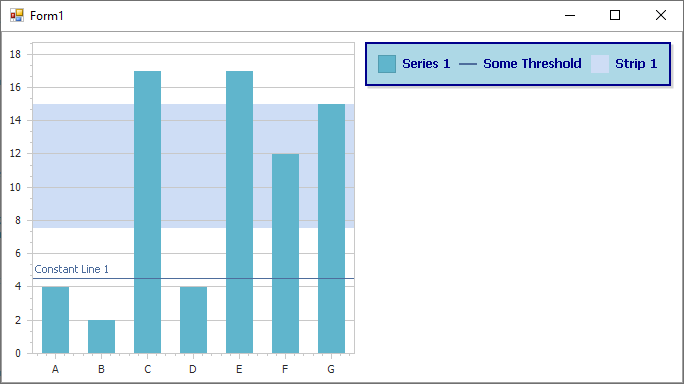LegendBase.AlignmentVertical Property
Gets or sets the legend’s vertical alignment within the chart control.
Namespace: DevExpress.XtraCharts
Assembly: DevExpress.XtraCharts.v25.2.dll
NuGet Package: DevExpress.Charts
Declaration
[XtraChartsLocalizableCategory(XtraChartsCategory.Behavior)]
public LegendAlignmentVertical AlignmentVertical { get; set; }Property Value
| Type | Description |
|---|---|
| LegendAlignmentVertical | A LegendAlignmentVertical enumeration member which specifies the legend’s vertical alignment within the chart control. |
Available values:
| Name | Description |
|---|---|
| TopOutside | The legend is positioned at the top of the Chart control.
|
| Top | The legend is positioned level with the top of the Diagram.
|
| Center | The legend is centered vertically.
|
| Bottom | The legend is positioned level with the bottom of the Diagram.
|
| BottomOutside | The legend is positioned at the bottom of the Chart control.
|
Remarks
To specify the legend’s horizontal alignment use the LegendBase.AlignmentHorizontal property.
For more information, refer to Legends.
Example
This example demonstrates how to access a chart’s Legend and customize its appearance at runtime.

To specify whether series, indicators, Constant Lines, and Strips should be shown in the legend, set their SeriesBase.ShowInLegend, Indicator.ShowInLegend, ConstantLine.ShowInLegend, and Strip.ShowInLegend properties to true.
using System;
using System.Drawing;
using System.Windows.Forms;
using DevExpress.Drawing;
using DevExpress.XtraCharts;
namespace ChartLegend {
public partial class Form1 : Form {
public Form1() {
InitializeComponent();
}
private void Form1_Load(object sender, EventArgs e) {
// Create an empty chart.
ChartControl chartControl1 = new ChartControl();
// Create a series and add points to it.
Series series1 = new Series("Series 1", ViewType.Bar);
series1.Points.Add(new SeriesPoint("A", new double[] { 4 }));
series1.Points.Add(new SeriesPoint("B", new double[] { 2 }));
series1.Points.Add(new SeriesPoint("C", new double[] { 17 }));
series1.Points.Add(new SeriesPoint("D", new double[] { 4 }));
series1.Points.Add(new SeriesPoint("E", new double[] { 17 }));
series1.Points.Add(new SeriesPoint("F", new double[] { 12 }));
series1.Points.Add(new SeriesPoint("G", new double[] { 15 }));
// Add the series to the chart.
chartControl1.Series.Add(series1);
// Create a constant line (optional).
ConstantLine constantLine1 = new ConstantLine("Constant Line 1");
((XYDiagram)chartControl1.Diagram).AxisY.ConstantLines.Add(constantLine1);
constantLine1.AxisValue = 4.5;
// Create a strip (optional).
Strip strip1 = new Strip("Strip 1");
((XYDiagram)chartControl1.Diagram).AxisY.Strips.Add(strip1);
strip1.MaxLimit.AxisValue = 15;
strip1.MinLimit.AxisValue = 7.5;
// Customize the strip's and constant line's legend appearance.
strip1.ShowInLegend = true;
constantLine1.ShowInLegend = true;
constantLine1.LegendText = "Some Threshold";
// Display the chart control's legend.
chartControl1.Legend.Visibility = DevExpress.Utils.DefaultBoolean.True;
// Define its horizontal and vertical alignment.
chartControl1.Legend.AlignmentHorizontal = LegendAlignmentHorizontal.RightOutside;
chartControl1.Legend.AlignmentVertical = LegendAlignmentVertical.Top;
// Define the layout of items within the legend.
chartControl1.Legend.Direction = LegendDirection.LeftToRight;
chartControl1.Legend.EquallySpacedItems = true;
chartControl1.Legend.HorizontalIndent = 4;
chartControl1.Legend.VerticalIndent = 4;
chartControl1.Legend.TextOffset = 4;
// Define the limits for the legend to occupy the chart's space.
chartControl1.Legend.MaxHorizontalPercentage = 50;
chartControl1.Legend.MaxVerticalPercentage = 50;
// Define the legend markers' options.
chartControl1.Legend.MarkerVisible = true;
chartControl1.Legend.MarkerSize = new Size(20, 20);
// Customize the legend appearance.
chartControl1.Legend.BackColor = Color.LightBlue;
chartControl1.Legend.FillStyle.FillMode = FillMode.Empty;
chartControl1.Legend.Border.Color = Color.DarkBlue;
chartControl1.Legend.Border.Thickness = 2;
chartControl1.Legend.Border.Visibility = DevExpress.Utils.DefaultBoolean.True;
chartControl1.Legend.Shadow.Visible = true;
chartControl1.Legend.Shadow.Color = Color.LightGray;
chartControl1.Legend.Shadow.Size = 2;
// Customize the legend text properties.
chartControl1.Legend.EnableAntialiasing = DevExpress.Utils.DefaultBoolean.False;
chartControl1.Legend.DXFont = new DXFont("Tahoma", 9, DXFontStyle.Bold);
chartControl1.Legend.TextColor = Color.DarkBlue;
// Add the chart to the form.
chartControl1.Dock = DockStyle.Fill;
this.Controls.Add(chartControl1);
}
}
}
Related GitHub Examples
The following code snippets (auto-collected from DevExpress Examples) contain references to the AlignmentVertical property.
Note
The algorithm used to collect these code examples remains a work in progress. Accordingly, the links and snippets below may produce inaccurate results. If you encounter an issue with code examples below, please use the feedback form on this page to report the issue.




